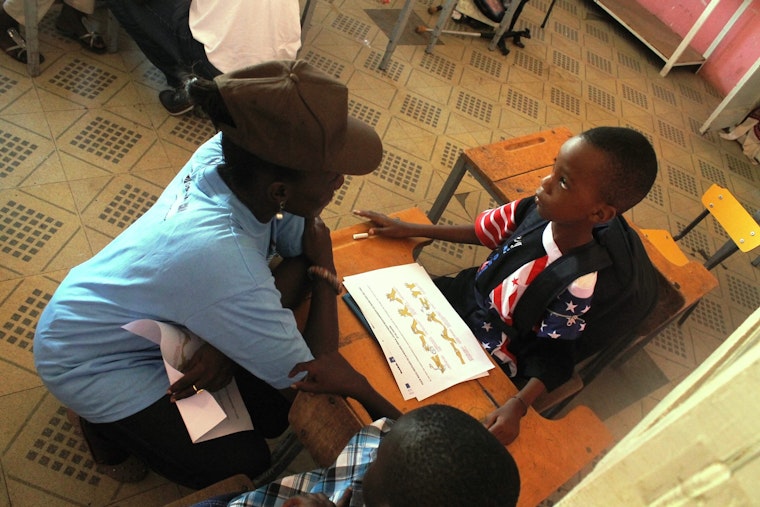In Sparks of a Fire, Lessons for West African Health
By Amanda Fortier

When you work in West Africa, threats to stability lurk in many corners, as our staff in Dakar recently remembered when a fire broke out just before our presentation in a local schoolyard.
We were preparing to gather for the final presentations of an Ebola sensitization exercise in a local schoolyard when sparks started crackling from an electrical box hanging on the side of the concrete building. People flew into motion, grabbing empty buckets, filling them with sand, and hurling them at the whizzes and pops creeping up the electrical line. Though we waited 15 minutes for firemen, once they arrived in their protective clothing and high-pressure hoses, the situation abated quickly. The irony lingered, though.
The incident reminded us that prevention, whether of fires or epidemics, requires skills and means.
This was the second of two scheduled Ebola-prevention visits by Open Society Initiative for West Africa staff to local schools. At this school, runaway flames evidently constituted a real risk. This fire could have spread much farther had it reached the common line overhead. Had there even been one single fire extinguisher available, these small sparks could have been quickly stifled. No firemen necessary.
Luck was on our side, but this may not be the case the next time. This holds instructive parallels with Ebola.
In much international public discourse, West Africa and Ebola have often become seemingly synonymous. As the virus spreads as far as New York City, let’s remember how vital it can be to teach people not only that it spreads but how it spreads.
Here in Senegal, the first Ebola case was declared in late August, notably almost a year after the disease appeared in neighboring Guinea. But weeks after a young male student who imported the virus into Senegal by bus from Guinea, he recovered, and the country managed to stop the disease. So had Nigeria, farther east. But this hardly means either country is in the clear. It only means—like the fire at the primary school—that this isolated Ebola case was contained before it got out of control.
Though media insistently labels Senegal “Ebola-free,” it’s important to help the country’s people remain risk-ready. So now is the time to methodically train local populations and ensure priority preventative measures exist for future “inevitables.”
Fighting Ebola requires having awareness. But having awareness also requires having the means and taking the time. There’s no better way to start than in schools, from the ground up. And this is exactly the opportunity that the Open Society Initiative for West Africa has tried to corral.
Our staff raised over $1,500 to buy jerry cans, crates of soap, bleach, and stools. (That cost represents about five times what an average Dakar resident earns in a month.) We then went to deliver and set up these materials, then give demonstrations on proper hand-washing techniques.
At the first school, one catering to nearly 1,000 kids in one of Dakar’s poorest suburbs, boys and girls between the ages of six and thirteen sat on their hands and knees in the sand-filled courtyard, under the shade of its sprawling trees. A representative from Senegal’s Health Ministry, a school inspector, members of the parents’ association, and our staff led the short demonstrations, then engaged in a question-and-answer session that left many of the students jumping up and down for their own chance to lather soapy suds before their peers.
On the second day, the day of the fire, the same group of staff met face to face with children with special needs, who often fall last in line for all resources. Splitting into smaller groups, our staff used visual aids and antics to help demonstrate early warning signs of Ebola. Some classrooms did not even have light bulbs, but many kids visibly took their time to demonstrate their newfound Ebola-prevention skills, thoroughly cleaning their hands, massaging their wrists, even scrubbing under their fingernails.
We concluded that we had made an impression and introduced key skills. “Children must become our Ebola-prevention ambassadors in our homes,” said the Senegal Health Ministry representative.
But as with all aid efforts, only time will tell how well these donations are used and how effectively these demonstrations turn into habits. Meanwhile, the only sparks we hope to keep igniting at schools in Dakar are the ones of enthusiasm to prevent Ebola.
Until October 2015, Amanda Fortier was a communications officer for the Open Society Initiative for West Africa.